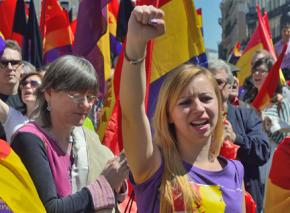After the abdication
Spanish King Juan Carlos, who has ruled Spain since the death of dictator Francisco Franco in 1975, announced he would abdicate his throne in favor of his son, Juan Carlos Felipe.
The abdication comes after months of scandal involving the king's son-in-law, Iñaki Urdangarin, who has been accused of embezzling millions of euros from sporting events through his foundation, the Nóos Institute. Among ordinary Spaniards, the royal family is increasingly seen as an emblem of the 1 Percent in a time of economic crisis and austerity--a view cemented by things like Juan Carlos's elephant hunting-trip to Botswana two years ago, during which he broke his hip and was flown home to be treated in a luxurious clinic, with ordinary Spaniards picking up the bill. A recent poll in El Mundo showed that less than 50 percent of Spaniards support the monarchy. After the abdication announcement, ten of thousands took to the streets to call for a national referendum on abolishing the monarchy.
, a social movement activist in Barcelona and journalist who writes the blog EstherVivas.com, analyzes the abdication announcement and the response it provoked.
THE REGIME is collapsing--it is dying, and in its last-ditch struggle to survive, the king has abdicated. Never has the regime resulting from "the Transition" [the name given to the political process following the death of Franco, which culminated in the Constitution of 1978] been as widely challenged as it is today. The pillars on which it rests--the monarchy, the judiciary, bipartisanship--have been greatly delegitimized for some time now.
We no longer believe in their lies, those lies with which they are trying to hold together a system that is falling apart. What seemed not so long ago impossible appears today as a reality. Let us push with all our might to widen even further this breach that the economic, social and political crisis has made possible.
Since the elephant hunt of his "majesty" in Botswana, through the indictment of his son- in-law Iñaki Urdangarin in the "Nóos affair" and the involvement of the Infanta Cristina in this case--and including the many operations on the monarch's hip, costing millions and paid out of public funds--the royal house has become a caricature of itself. One of the main justifications of "democracy" is mortally wounded, but it is not dead yet.

The announcement of the royal abdication is a final, desperate attempt to save the regime--an attempt at a "facelift" with the aim of restoring legitimacy not only to the monarchy, but also to its suite of judges, politicians and opinion formers. For years, far too many years, they have lived under the shelter of this false Transition, trying to efface or hide our collective history. Our forgetfulness has been the substrate of their victory, not only moral but also political and economic.
THE ECONOMIC crisis, transformed into a profound social and also political crisis, has put the king and the regime of 1978 on the ropes. People have said, "Basta." ("Enough")
We saw it three years ago with the emergence of the May 15 Movement; with the spread of civil disobedience; with the occupation of empty homes that were in the hands of banks--and all of that taking place with broad popular support, despite the criminalization of protest. More poverty means more pain, but thanks to these mobilizations, it also means greater awareness of who the winners are in this situation--the bankers, the politicians--and who the losers are.
The rising demand for sovereignty in Catalonia has also thrown the regime on the ropes, highlighting the deeply anti-democratic nature of a Constitution that does not allow the right to self-determination.
Today, the European elections have given the "coup de grace" to a decaying regime, with the loss of more than 5 million votes for the People's Party and the Spanish Socialist Workers Party (PSOE, by its initials in Spanish) and the emergence, with the election of five members to parliament, of the left wing "We Can" (Podemos). The regime is becoming nervous, very nervous.
The royal abdication is the latest rescue maneuver. But we must nevertheless remember that the system still has room for maneuver. The abdication of the king illustrates the weakness of the pillars of the regime and the strength of the people. But we do not want Juan Carlos Felipe either.
It's time to go out into the streets to demand the opening of constituent processes throughout the Spanish state, in order to decide what kind of future we want. We must go on the offensive in order to checkmate the regime.
First published at Publico.es. Translated by International View Point.


